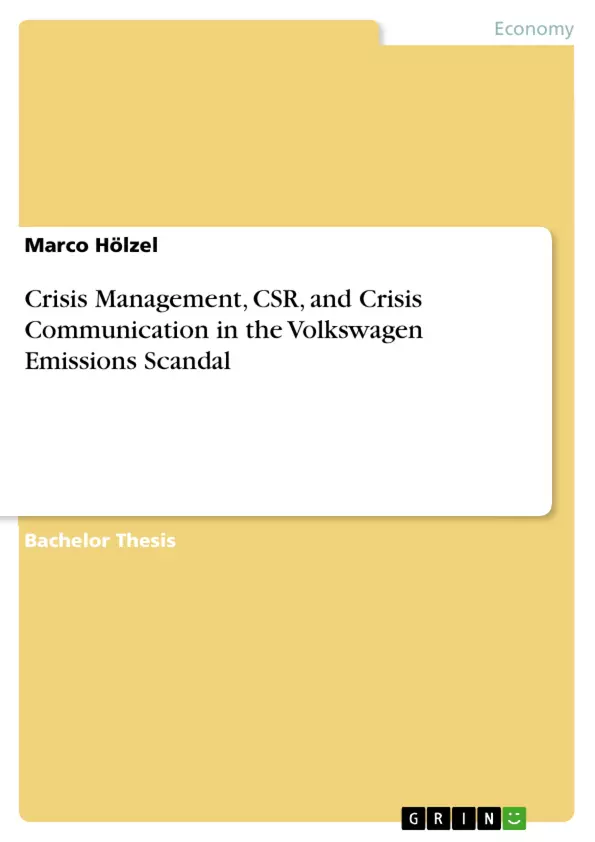The purpose of this research is to examine the crisis management and crisis communication of the German car company Volkswagen (VW) in its recent emissions scandal. This study aims to analyse the applied crisis management and communication strategies of Volkswagen by evaluating the crisis´ impact on each stakeholder group. To accomplish this, the research adopts a single case study design, and it considers a significant amount of qualitative, secondary data.
The research first notes that Volkswagen failed in its crisis management prevention tactics, as it was unable to detect the crisis at an early stage. Moreover, the study reveals that VW implemented several immediate crisis management measures for a quick turnaround management. Instead of concentrating on a specific crisis response theory, it is evident that VW made use of different crisis response strategies. VW took full responsibility for the crisis, promising transparency, but it also shifted the blame onto a small group of employees, suggesting that the company was also the victim of human error.
Finally, the study reveals the significant impact of the crisis on each stakeholder group, which reveals that VW struggled to regain stakeholder trust and did not keep its promise of transparency. Thus, the study concludes by presenting future recommendations for Volkswagen in order to rebuild trust and avoid similar crises from occurring in the future.
Inhaltsverzeichnis (Table of Contents)
- 1. INTRODUCTION
- 1.1 THE BACKGROUND OF UNCERTAINTY AND OCCURRENCE OF CRISES
- 1.2 VW AND THE EMISSION CRISIS
- 2. DEFINITION OF CRISES
- 2.1 CRISES AND CORPORATE CRISES
- 2.2 DIFFERENT TYPES OF CORPORATE CRISES
- 3. CSR, CRISIS MANAGEMENT & CRISIS COMMUNICATION
- 3.1 CORPORATE SOCIAL RESPONSIBILITY & STAKEHOLDER MANAGEMENT
- 3.2 THE PROCESS OF CRISIS MANAGEMENT
- 3.3 CRISIS COMMUNICATION & CRISIS RESPONSE STRATEGIES
- 4. METHODOLOGY
- 4.1 MOTIVATION
- 4.2 RESEARCH PHILOSOPHY
- 4.3 RESEARCH DESIGN
- 4.4 DATA COLLECTION
- 4.5 DATA ANALYSIS
- 4.6 ETHICS
- 4.7 LIMITATIONS
- 5. DISCUSSION AND FINDINGS - THE VW CRISIS
- 5.1. BACKGROUND OF VW's \"EMISSION ISSUE\"
- 5.2 THE EMERGENCE OF THE CRISIS
- 5.2.1 May December 2014
- 5.2.2 September 03, 2015
- 5.2.3 September 18, 2015
- 5.3 ANALYSIS OF VOLKSWAGEN PRESS RELEASES AFTER THE EMERGENCE OF THE CRISIS
- 5.4 VW'S CRISIS MANAGEMENT FROM A STAKEHOLDER PERSPECTIVE
- 5.4.1 Capital Market
- 5.4.2 Society
- 5.4.3 Customers
- 5.4.4 Partners
Zielsetzung und Themenschwerpunkte (Objectives and Key Themes)
This thesis aims to examine the crisis management and communication strategies employed by Volkswagen (VW) during its recent emissions scandal. The study analyzes the applied crisis management and communication strategies, ultimately evaluating the crisis' impact on various stakeholder groups. To achieve this, the research utilizes a single case study approach, drawing upon a substantial amount of qualitative, secondary data.
- The role of crisis management and communication in corporate scandals.
- The impact of corporate crises on stakeholder trust and relationships.
- The analysis of Volkswagen's crisis management strategies and their effectiveness.
- The relationship between corporate social responsibility (CSR) and crisis management.
- The challenges of regaining stakeholder trust after a major corporate crisis.
Zusammenfassung der Kapitel (Chapter Summaries)
The first chapter introduces the broader context of crises in the contemporary business environment, highlighting the increasing uncertainty and the potential for crises to arise. The chapter specifically focuses on Volkswagen (VW) and its emissions crisis, setting the stage for the in-depth analysis that follows.
Chapter 2 provides a definition of crises and corporate crises, exploring the different types of corporate crises that organizations might face. It lays the groundwork for understanding the nature of the VW crisis within a broader framework of corporate crisis literature.
Chapter 3 delves into the interconnected concepts of CSR, crisis management, and crisis communication. It examines the role of stakeholder management in CSR, outlining the process of crisis management and the various strategies used in crisis communication and response.
Chapter 4 outlines the methodology used in the study. It explains the motivation for the research, the research philosophy and design, data collection and analysis methods, ethical considerations, and limitations of the study.
Chapter 5 delves into the discussion and findings related to the VW crisis. It explores the background of the emissions issue, the emergence of the crisis, and analyzes Volkswagen's press releases following the public revelation of the scandal. The chapter further examines the impact of the crisis from the perspective of various stakeholder groups, including the capital market, society, customers, and partners.
Schlüsselwörter (Keywords)
This research focuses on the intersection of crisis management, crisis communication, and corporate social responsibility (CSR) in the context of the Volkswagen emissions scandal. It explores the challenges of stakeholder engagement, the importance of transparency, and the impact of crisis response strategies on regaining trust. The key concepts include crisis management, crisis communication, corporate crises, stakeholder engagement, Volkswagen, emission issue, and defeat device.
Frequently Asked Questions
What was the Volkswagen emissions scandal?
The scandal involved Volkswagen using "defeat devices" in diesel engines to cheat on emissions tests, making cars appear more environmentally friendly than they actually were.
How did VW handle its crisis communication?
VW initially struggled with transparency. They used a mix of strategies, including taking responsibility but also shifting blame to a small group of employees to suggest human error.
What was the impact on VW's stakeholders?
The crisis significantly damaged trust among customers, society, and the capital market, leading to financial losses and a severely tarnished brand reputation.
What is the link between CSR and crisis management?
Corporate Social Responsibility (CSR) serves as a foundation for stakeholder trust. VW’s failure in CSR made the crisis management more difficult as they failed to live up to their ethical promises.
How can VW rebuild trust after the scandal?
The study recommends radical transparency, long-term commitment to ethical standards, and concrete measures to ensure such manipulation cannot happen again in the future.
- Quote paper
- Marco Hölzel (Author), 2017, Crisis Management, CSR, and Crisis Communication in the Volkswagen Emissions Scandal, Munich, GRIN Verlag, https://www.grin.com/document/417476



